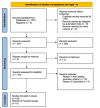Beyond the Screen: The Impact of Generative Artificial Intelligence (AI) on Patient Learning and the Patient-Physician Relationship
- PMID: 39897260
- PMCID: PMC11787409
- DOI: 10.7759/cureus.76825
Beyond the Screen: The Impact of Generative Artificial Intelligence (AI) on Patient Learning and the Patient-Physician Relationship
Abstract
The rapid advancement of generative artificial intelligence (AI), exemplified by tools like ChatGPT, has transformed the healthcare landscape, particularly in patient education and the patient-physician relationship. While AI in healthcare has traditionally focused on data analysis and predictive analytics, the rise of generative AI has introduced new opportunities and challenges in patient interactions, information dissemination, and the overall dynamics of patient care. This narrative review explores the dual impact of generative AI on healthcare, examining its role in enhancing patients' understanding of medical conditions, promoting self-care, and supporting healthcare decision-making. Additionally, the review considers the potential risks, such as the erosion of trust in the patient-physician relationship and the spread of misinformation, while addressing ethical implications and the future integration into clinical practice. A comprehensive literature search, conducted using databases like PubMed, MEDLINE, Scopus, and Google Scholar, included studies published between 2010 and 2024 that discussed the role of generative AI in patient education, engagement, and the patient-physician relationship. Findings show that generative AI tools significantly enhance patient health literacy by making complex medical information more accessible, personalized, and interactive, thus empowering patients to take a more active role in managing their healthcare. However, risks such as misinformation and the undermining of the patient-physician relationship were also identified, with case studies highlighting both positive and negative outcomes. To fully harness the potential of AI in healthcare, it is essential to integrate these tools thoughtfully, ensuring they complement rather than replace the personalized care provided by physicians. Future research should focus on addressing ethical challenges and optimizing AI's role in clinical practice to maintain trust, communication, and the quality of patient care.
Keywords: ethical implications of ai; generative ai; healthcare decision-making; patient education; patient-physician relationship.
Copyright © 2025, Traylor et al.
Conflict of interest statement
Conflicts of interest: In compliance with the ICMJE uniform disclosure form, all authors declare the following: Payment/services info: All authors have declared that no financial support was received from any organization for the submitted work. Financial relationships: All authors have declared that they have no financial relationships at present or within the previous three years with any organizations that might have an interest in the submitted work. Other relationships: All authors have declared that there are no other relationships or activities that could appear to have influenced the submitted work.
Figures


References
-
- Generative AI in medicine and healthcare: promises, opportunities, and challenges. Zhang P, Boulous M. Future Internet. 2023;15:286.
-
- Kuzlu M, Zhang X, Sarp S, et al. 2023 12th Mediterranean Conference on Embedded Computing (MECO) Budva, Montenegro: IEEE; 2023. The rise of generative artificial intelligence in healthcare; pp. 1–4.
-
- A comprehensive review of generative AI in healthcare. Shokrollahi Y, Yarmohammadtoosky S, Nikahd MM, et al. arXiv (Cornell) 2023;1:795.
-
- Predictive analytics in healthcare: harnessing AI for early disease detection. Burri V, Mukku L. Glob J Res Anal. 2024;2024:34–36.
-
- AI’s impact on personalized medicine: tailoring treatments for improved health outcomes. Udegbe FC, Ebulue OR, Ebulue CC, et al. Eng Sci Technol J. 2024;5:1386–1394.
Publication types
LinkOut - more resources
Full Text Sources
